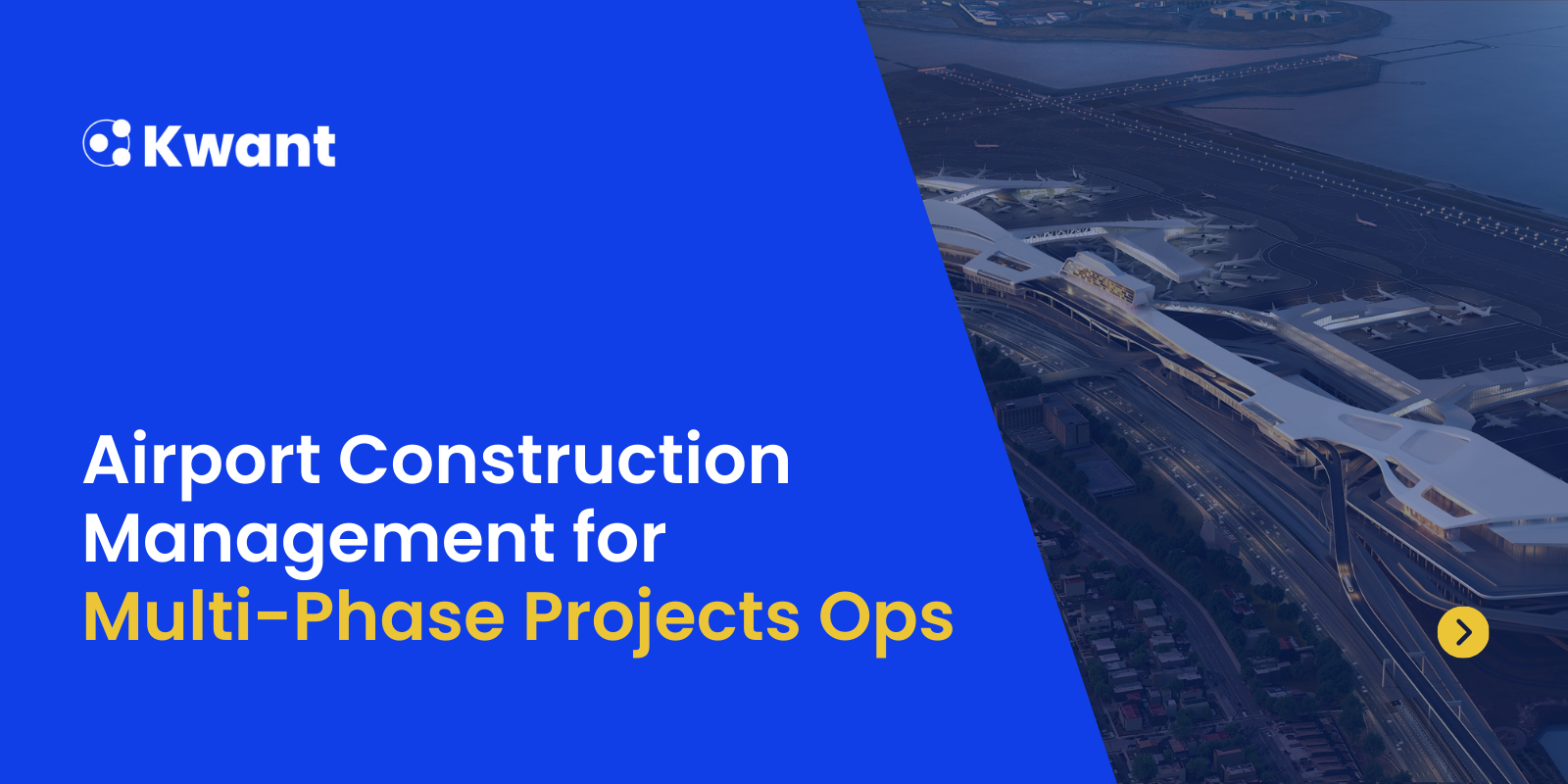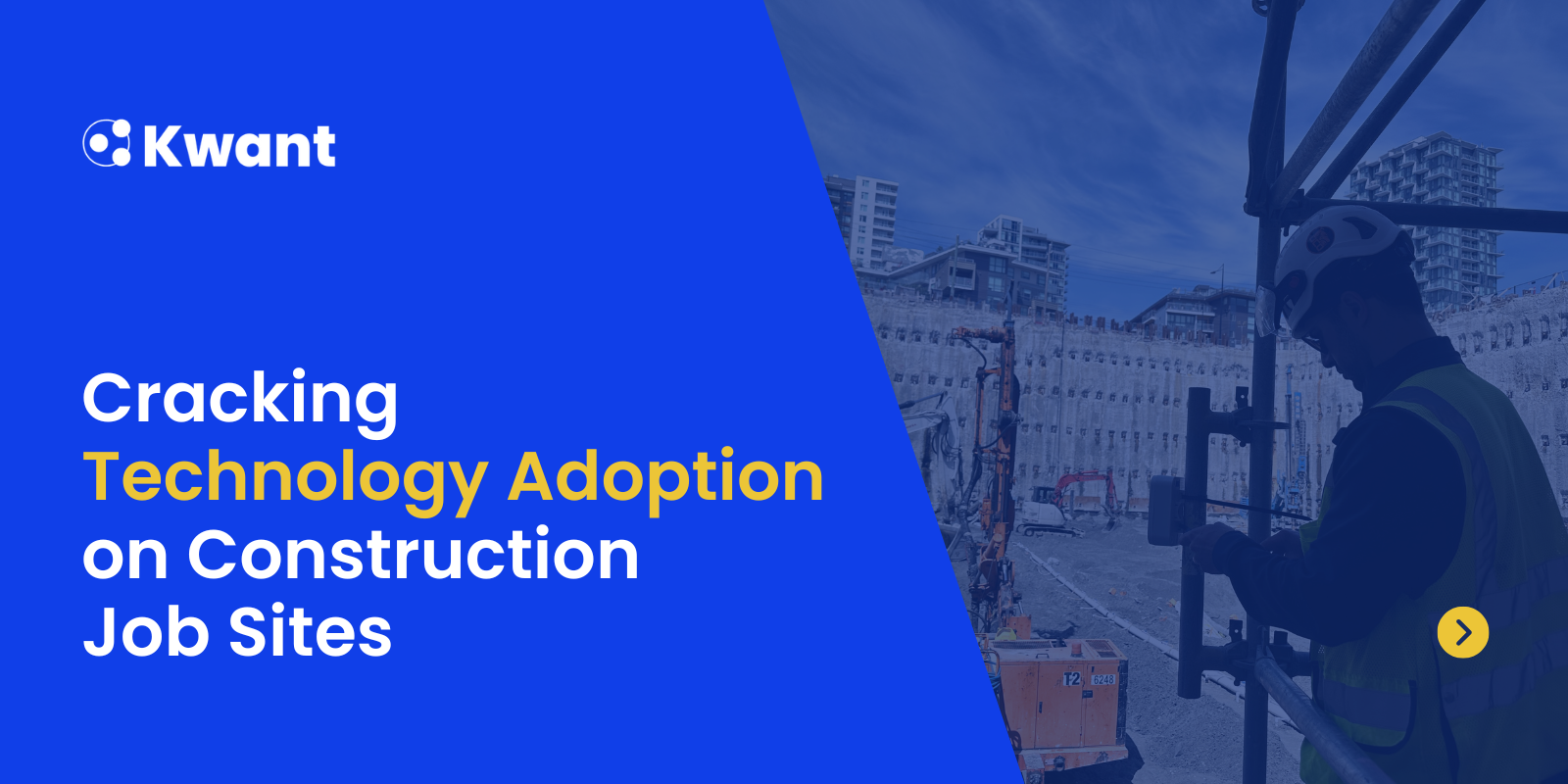The construction industry operates in dynamic and challenging environments, with construction sites serving as the center of activity. These sites contain large machinery, labor, and materials where complex projects take place within tight deadlines and strict safety regulations.
One of the main challenges for contractors is coordinating diverse teams of subcontractors, suppliers, and workers. The large number of stakeholders involved in a construction project can cause communication breakdowns, scheduling conflicts, and inefficiencies in resource allocation.
To overcome these challenges, construction companies need contractor management software like Kwant. Kwant is an end-to-end construction workforce management platform. It operates as contractor management software, serving general contractors to efficiently manage the workforce, ensure worker safety, reduce costs, and increase profitability.
What is Contractor Management Software?
Contractor Management Software (CMS) is a specialized platform designed to automate the processes associated with managing contractors, subcontractors, and other third-party service providers within an organization. In the construction industry, it serves as a tool for overseeing multiple contractors and subcontractors involved in various projects.
Companies can use contractor software to automate or significantly reduce earlier complicated and manual activities, helping them to spend their resources more effectively. Likewise, contractors' safety systems and management systems must be audited to ensure compliance with industry standards and regulations regularly.
What are the Challenges of managing independent contractors?
Independent contractors are specialized professionals hired to perform specific tasks on a project basis. These contractors include general contractors, subcontractors, specialty contractors, consultants, equipment operators, and workforce. Some common challenges faced by independent contractors are:
- Independent contractors receive irregular payments and do not have employment-related taxes deducted.
- Integration challenges require effective onboarding and communication strategies.
- Building long-term relationships with high-performing contractors.
- Maintaining clear and consistent communication with independent contractors who may not be working regular hours or in the same location can be difficult.
- Independent contractors often work with multiple clients, which raises the risk of confidential information being shared unintentionally.
You Must Also Read:- Workforce Management Platform
Top 5 Key Features of Contractor Management Software
Contractor management software simplifies contractor onboarding and centralizes contract management, offering businesses insights and ensuring legal compliance. Here are some features of contractor software:
- Onboarding Efficiency: Contractor tracking software Kwant simplifies the onboarding process for general contractors. They use Kwant to onboard workers and contractors for a project, customize onboarding forms, and manage training content and media. Kwant also helps capture and centralize necessary workforce information for the project.
- Daily insights and reports: Contractor software enables contractors to generate daily insights into worker performance and project progress. This feature empowers project managers to stay informed about the ongoing activities on the construction site, facilitating proactive decision-making.
- Compliance Tracking: With contractor software, contractors can easily monitor and maintain compliance with regulations and industry standards. The platform helps identify employees whose licenses or certifications have expired, ensuring they renew them promptly for compliance and safety.
- Payment Options: Flexible payment options are often integrated into CMS platforms, allowing companies to set payment terms and contractors to choose their preferred payment methods. This may include options such as direct deposit, electronic transfer, or payment through third-party services.
- Talent Identification and Invitations: Some construction tracking software platforms allow you to identify contractors who are appropriate for specific projects based on their skills, experience, and availability. Contractors can be invited to express interest or apply for assignments directly through the system.

Best 5 Benefits of Contractor Management Software
Managing a large network of contractors, subcontractors, and workforce is challenging in the construction industry. Traditional methods such as paper trails and endless spreadsheets are prone to errors, delays, and communication breakdowns. Therefore, good contractor management software can help manage all the tasks related to the construction workforce. Below are the top five benefits of utilizing contractor management software:
- Easy onboarding: Contractor software simplifies contractor hiring and onboarding, automating workflows from start to finish, minimizing administrative tasks, and ensuring efficient completion of onboarding processes.
- Budget management: Contractor management software saves time and cuts costs by reducing manual work, overhead, and staffing expenses, while providing accurate expense tracking for efficient budget allocation.
- Compliance management: Contractor software streamlines compliance in construction by verifying contractor identities, tracking certification expirations, and mitigating risks of fines or legal liabilities.
- Streamline contractor experience: Improves contractor experience by enhancing communication, onboarding, payments, and project briefings, benefiting both contractors and workers.
- Efficient project management: CMS optimizes construction project management by monitoring workforce performance, resources, compliance, budgets, and construction project processes.
What are the limitations of Contractor Management Software?
Contractor management software can be valuable for streamlining processes and improving project management efficiency in construction sites. However, it does come with its own set of limitations. Below are some of them:
- Data Security Risks: Project confidentiality and compliance can be at risk due to cyber threats and unauthorized access.
- Scalability Challenges: Difficulty in handling large volumes of data or supporting multiple projects simultaneously may lead to performance issues.
- Integration Challenges: Limited compatibility with other construction management systems can lead to data silos and hinder collaboration.
- Cost Considerations: For smaller construction companies, licensing, implementation, and training may be prohibitively expensive.
- Regulatory Compliance: Failure to manage regulatory requirements and safety standards may result in legal penalties.
- Technical Issues: Software bugs, system crashes, or compatibility issues can disrupt project workflows and impact timelines.
Best 3 Contractor Management Software Solutions
Selecting the right software for managing contractors is an important decision for any construction company. Just like selecting the right equipment on a job site, the choice of contractor management software can significantly impact project efficiency and success.
Here are the top 3 contractor tracking software with their top features:
1. Kwant AI Contractor Management Software
Kwant AI is the best workforce management platform that accelerates productivity and improves safety in the construction industry. With over 102,000 workers supported and 203,000 smart badges deployed, Kwant streamlines construction processes using IoT devices and software for real-time safety and productivity. General contractors gain access to daily insights and reports while maintaining control over team management.
General contractors are leveraging contractor tracking software to streamline construction safety and enhance productivity rates. With Kwant, construction companies automate processes, reduce paperwork, and improve communication, leading to better budget and resource management while ensuring worker safety.
Features of Kwant AI Contractor Management Software
- Unlocking real-time insights, alerts, and analytics on projects.
- Automate construction daily reports
- Smart badges with real-time headcount automation, with added features like fall detection and SOS alerts
- Regardless of the location within a construction site, companies can track contractors' presence in the correct zones, be it floor one, the basement, or floor five.
- Compliance management includes tracking certificates and licenses for both contractors and the workforce.
- Tracking performance rates, identifying trends, and generating valuable reports for data-driven decisions.
- Kwant automates contractor headcounts, simplifying management by zone and floor.
- Monitoring contractor performance leads to improved productivity and efficiency.
You Must Also Read:- Workforce Operating System
2. Procore
Procore is an all-in-one construction management software designed to help builders complete projects safely, on time, and within budget. It comes with robust reporting and analytics tools. Procore maximizes ROI, reduces rework, and improves overall project quality by connecting everyone involved in construction projects.
Features of Procore
- Task scheduling and management
- Daily logs and progress reporting
- Document management
- Subcontractor Invoices (Bill Management)
- Timecard Management
3. OpenSpace
OpenSpace is a powerful reality capture and analytics platform designed for the construction industry. It addresses industry challenges head-on through state-of-the-art technology, introducing innovation, transparency, and objectivity to construction processes.
Features of OpenSpace
- 360 site capture
- AI-power mapping
- Real-time progress tracking and coordination
- Predictive Analytics
- Quality control

How to Choose the Right Contractor Management Software?
With so many contractor management software out there, finding the perfect fit for your construction industry might seem like a big task. However, by following a structured approach and considering key factors, you can make a well-informed decision that aligns with your company's needs and objectives. Here are 8 best practices to guide you through the selection process:
- Determine your needs: Understand what your construction projects require and the challenges contractors and workforce. Figure out which features are essential, like document management, project tracking, easy onboarding, and compliance monitoring.
- Budget-friendly: Find contractor software that fits your budget and meets your core requirements. Focus on essential features that support your goals and avoid overspending on unnecessary extras.
- Connect Seamlessly: Look for software that integrates well with your existing tools, such as workforce management tools. Integration helps streamline workflows and improve data accuracy.
- Data Security: Construction projects involve sensitive information such as contracts, financial records, and personnel details. Prioritize software that employs robust security measures to protect your data from breaches, unauthorized access, and cyber threats.
- Scalability: Choose a contractor-tracking software solution that can scale with your business as it grows. Consider factors like the number of users, projects, and contractors you anticipate managing in the future.
- Customization Options: Every construction company operates differently. Select software that offers customization options, allowing you to tailor the system to match your unique workflows and processes.
- Mobile Accessibility: Construction sites often have workers on the move. Make sure your software is mobile-friendly so that contractors and project managers can access critical information, submit reports, and communicate in real-time from anywhere.
- Compliance and Regulations: Ensure that the contractor software complies with industry regulations and standards, such as OSHA requirements. Look for features that facilitate compliance monitoring and reporting to avoid legal issues and penalties.
Interested in Learning More About KwantAI Contractor Management Software?
Unlock the potential of your contractor management with Kwant AI. The key to effective workforce management lies in careful preparation. Kwant empowers construction companies like yours to achieve greater efficiency, safety, and profitability.
With Kwant AI, you can automate repetitive tasks, mitigate risks, and ensure seamless communication across your entire workforce. Don't settle for outdated methods- embrace the future of contractor management with Kwant AI. Request a demo today and unlock the full potential of your construction projects.
.svg)











%20(1).svg)







